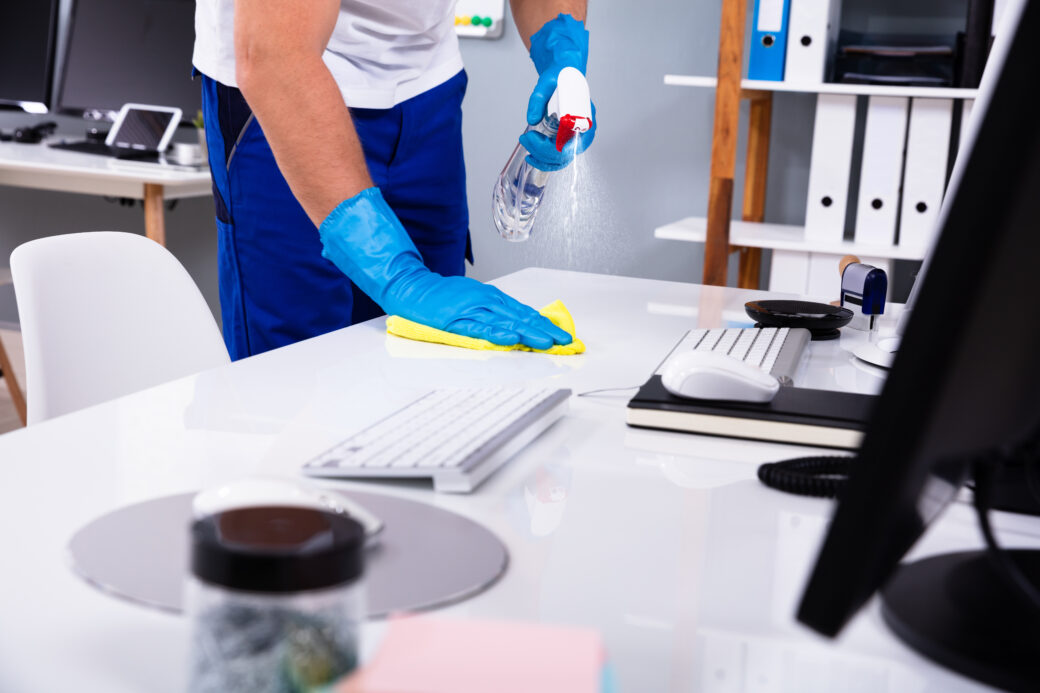An office cleaner is expected to maintain a clean, organized, and hygienic environment for employees and visitors. Their job goes beyond simply tidying up—it’s about ensuring the office space remains comfortable, safe, and conducive to productivity.
Here’s an overview of what is typically expected of an office cleaner…
General Cleaning Responsibilities
- Vacuuming and Sweeping – Regular vacuuming of carpets, rugs, and mats, and sweeping of hard floors to remove dirt, dust, and debris. This includes cleaning high-traffic areas, like hallways and entryways.
- Mopping – Mopping of hard floors to ensure they’re free of dust, spills, and stains, using the appropriate cleaning solution for the surface (e.g., wood, tile, or laminate).
- Dusting – Dusting all surfaces, including desks, countertops, shelves, and furniture. This also includes areas that are often overlooked, like baseboards, window sills, light fixtures, and vents.
- Emptying Trash & Recycling – Removing trash and recycling from all office bins and ensuring that the bins are lined with fresh bags. This is especially important in high-traffic areas like kitchenettes or common spaces.
Restroom Cleaning
- Sanitizing – Thorough cleaning and sanitizing of restrooms, including toilets, sinks, and urinals. Ensuring these areas are free of germs and bacteria is crucial for office hygiene.
- Stocking Supplies – Checking and restocking supplies like toilet paper, paper towels, soap, and hand sanitizer. Cleaners are often responsible for maintaining the hygiene of these items.
- Mirrors & Surfaces – Cleaning mirrors, countertops, and any other hard surfaces to remove stains, soap scum, and fingerprints.
- Floors – Mopping and sanitizing restroom floors to remove dirt and prevent the buildup of grime or bacteria.
Kitchenette & Break Room Maintenance
- Cleaning Appliances – Wiping down kitchen appliances like microwaves, refrigerators, coffee machines, and dishwashers. This includes cleaning spills and crumbs in the fridge or on countertops.
- Sanitizing Surfaces – Wiping down countertops, tables, and sinks. Removing food debris and disinfecting surfaces to avoid the spread of germs.
- Dishwashing – In some cases, cleaners may be responsible for washing dishes, though this may be handled by employees depending on the office culture.
- Floor Care – Sweeping and mopping the kitchen or breakroom floor regularly.
Office Furniture & Equipment
- Wiping Down Desks and Furniture – Cleaning desks, chairs, filing cabinets, and other office furniture. This includes dusting and sanitizing surfaces, and sometimes wiping down computer monitors, phones, and keyboards (if permitted).
- Disinfecting High-Touch Areas – Cleaners are expected to sanitize frequently touched surfaces, like doorknobs, light switches, phones, and computers, especially in high-contact environments.
Window and Glass Cleaning
- Windows – Cleaning the inside of windows and glass doors, removing fingerprints, smudges, and dust.
- Glass Partitions – In offices with glass partitions or dividers, these should be wiped down to remove smudges, dust, and any streaks.
Maintaining a Clean and Organized Environment
- Tidying Up – Organizing clutter when possible, including straightening chairs, folding towels in restrooms, and arranging magazines or materials in waiting areas.
- Reporting Issues – A good office cleaner will report any damage to office equipment, furniture, or anything that needs attention (e.g., burned-out lightbulbs, broken equipment) to the appropriate office manager or supervisor.
Discretion and Respect for Privacy
- Confidentiality – Office cleaners are expected to respect the confidentiality of the work environment. They should not look through documents, files, or private items on desks or in drawers unless explicitly instructed to.
- Professionalism – Cleaners are expected to maintain a professional attitude, work quietly, and avoid disrupting employees while they are working.
General Health & Safety
- Sanitization – Cleaners are often responsible for maintaining a sanitized environment, particularly during flu seasons or other health crises (like the COVID-19 pandemic). This includes sanitizing surfaces regularly and following any special hygiene protocols set by the office.
- Proper Handling of Chemicals – They are expected to safely use and store cleaning chemicals, following any safety guidelines and wearing protective equipment (e.g., gloves, masks) as needed.
- Waste Disposal – Ensuring that all waste is properly disposed of, and any hazardous waste is handled according to local regulations.
Flexibility and Adaptability
- Customized Tasks – Depending on the needs of the office, an office cleaner might be asked to take on additional tasks (e.g., carpet cleaning, deep cleaning of specific areas). Flexibility to adapt to these requests is expected.
- Adjusting to Office Schedules – A good office cleaner will adjust their schedule to ensure that they clean the office at times that cause minimal disruption (early mornings, evenings, or weekends). They should be able to work around office hours without disturbing employees.
Communication
- Clear Reporting – If something needs attention or if an issue arises (e.g., a cleaning supply runs out, equipment malfunctions), an office cleaner should report it promptly to the office manager or appropriate person.
- Feedback – A good cleaner will accept feedback from office staff and management and be open to making improvements or adjustments to their cleaning routine.
Summary of Expectations
A good office cleaner should be reliable, thorough, respectful, and able to handle all tasks required to maintain a clean, safe, and productive office environment. They must be knowledgeable about cleaning techniques, use proper tools and cleaning products, and follow health and safety protocols. They should also respect the privacy of office workers and work in a manner that minimizes disruption to the office.

Leave a Comment